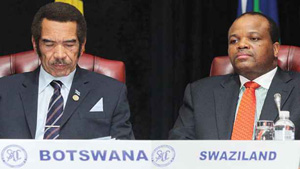Swaziland is one of several countries which are committing human rights abuses which the regional leaders should be addressing at the summit of the Southern African Development Community (SADC), HRW said.
The other countries are Angola, Democratic Republic of Congo (DRC) Mozambique, South Africa, Zimbabwe and Lesotho.
Senior HRW researcher Dewa Mavhinga, speaking at a press conference in Johannesburg on Tuesday, criticised Sadc for meeting in Swaziland, which is taking over the SADC chair for the next 12 months, because he said human rights had deteriorated significantly there.
“The government has imposed restrictions on political activism and trade unions that violate international law, including potential bans under the draconian Suppression of Terrorism Act and subjected activists and union leaders to arbitrary detention and unfair trials.
“Political repression and disregard for basic rights characterised several SADC countries over the past year,” he said, demanding concrete action from SADC to address these violations of human rights.”
Child marriage remained a concern in several SADC countries, he added. Half the girls in Malawi and one third in Zimbabwe marry before they turn 18. He called for all SADC countries to legislate a minimum age of 18.
Mavhinga said Zimbabwe President Robert Mugabe’s government was disregarding the rights enshrined in the country’s new constitution, neither enacting new laws to effect the constitution, nor amending existing laws to bring them into line with the constitution.
Mavhinga also criticised Zimbabwe police for violently dispersing an opposition protest in Harare last Friday, despite the High Court having given the go-ahead for it.
“The police are acting almost as an appendage of the ruling party,” he said, rather than upholding law and order. “And the ruling party is now openly attacking the judiciary” because the High Court had given permission for the protest march.
Mavhinga said the South African government seemed to be refraining from addressing the Zimbabwe crisis because of the ex-liberation movement solidarity between the African National Congress and Zanu PF.
Meanwhile, the DRC government had “brutally cracked down” on those opposing President Joseph Kabila’s attempts to extend his rule beyond the constitutional limit in November, Mavhinga said.
Elsewhere, Angolan security forces had used “excessive force, arbitrary arrests and intimidation to prevent peaceful anti-government protests, strikes and other gatherings.” They had killed one person and wounded at least three others by firing into recent protest gatherings.
In Mozambique, the rising political and military conflict between the government and the Renamo opposition had increased human rights abuses, Mavhinga said. “Since October 2015, tens of thousands of people have fled to Malawi because of abuses by the military, including summary executions, sexual violence and mistreatment of people in custody.”
He also condemned Renamo for its recent attacks on hospitals and clinics in Zambezia provinces.
Mavhinga noted that SADC was trying to address the crisis in Lesotho, a reference to its call on Prime Minister Pakalitha Mosisili to fire his controversial army chief Tlali Kamoli for complicity in the killing of his predecessor Maaparankoe Mahao in June last year.
But Mavhinga said the SADC leaders now needed to enforce that decision which Mosisili had been ignoring for many months.
Even in South Africa, public confidence in the government’s willingness to tackle human rights violations, corruption and respect for the rule of law had eroded.
This was mainly because the government had done little to address the poor treatment of migrants, refugees and asylum seekers, “or to address the root causes of xenophobic violence”.
Pretoria had not even acknowledged that the violence against migrants was xenophobic, Mavhinga said. This would be a good place to start. And it had done little to prosecute those responsible for it, including some police officers suspected of involvement.
--ANA--












